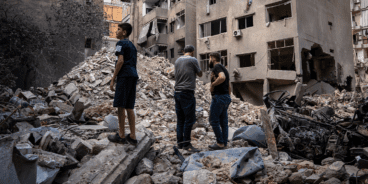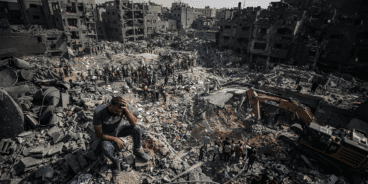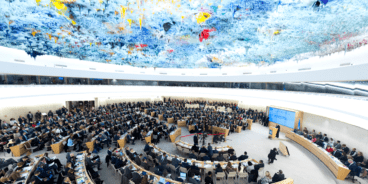
Atrocity Alert No. 154: Syria, South Sudan and Democratic Republic of the Congo
Atrocity Alert is a weekly publication by the Global Centre for the Responsibility to Protect highlighting situations where populations are at risk of, or are enduring, mass atrocity crimes.
Deadly escalation of war crimes in Idlib, Syria
Since 30 April Russian and Syrian government forces have increased their bombardment of Idlib, resulting in the heaviest fighting since Russia and Turkey agreed in September 2018 to establish a demilitarized zone in the province. The military escalation, which has targeted areas along strategic commercial highways, has damaged schools, residential areas and at least 12 hospitals. According to the Syrian Observatory for Human Rights, between 30 April and 6 May at least 69 civilians were killed.
Nearly 3 million people reside within Idlib province, many of whom have been displaced or evacuated from areas of Syria previously held by opposition forces. At least 150,000 civilians have been newly displaced by the recent escalation of hostilities and on 6 May UN Secretary-General António Guterres expressed alarm at disturbing reports of “aerial attacks on population centers and civilian infrastructure.”
The agreement that led to the establishment of the Idlib demilitarized zone has never been fully implemented. While Turkey was able to convince armed opposition groups to withdraw their heavy weaponry, it was unable to persuade fighters to completely withdraw from the area. During January 2019 implementation of the agreement was further complicated when Ha’yat Tahrir al-Sham, an al-Qaeda affiliate, consolidated armed control over the province.
During the final offensives on Eastern Aleppo and Eastern Ghouta during 2016 and 2018, Syrian government forces, with Russian air support, perpetrated potential war crimes and crimes against humanity as they retook control of both areas. A similar military offensive on Idlib could result in a catastrophic loss of life and further mass displacement. Systematic attacks on civilians and civilian infrastructure constitute violations of International Humanitarian Law, while targeted attacks on medical facilities also violate UN Security Council Resolution 2286.
Syrian government forces and their Russian allies, as well as all armed opposition groups operating in Idlib province, should commit to an immediate ceasefire and the full implementation of the demilitarized zone agreement.
South Sudan’s stalled peace agreement
On Friday, 3 May, President Salva Kiir and opposition leader Riek Machar agreed to a six-month extension of the deadline for implementation of several elements of the Revitalized Agreement on the Resolution of the Conflict in the Republic of South Sudan (R-ARCSS). Almost eight months after signing the R-ARCSS only marginal progress has been made on crucial components, including reunification of the armed forces and the demilitarization of Juba. As a result, the inauguration of a new power-sharing administration, with Kiir as President and Machar as Vice-President of a new Transitional Government of National Unity (TGoNU), has been delayed.
The signing of the R-ARCSS on 12 September 2018 brought hope for a permanent end to the conflict in South Sudan. The country’s five-year civil war killed an estimated 400,000 people and displaced over 4 million. During the civil war both sides committed widespread war crimes and crimes against humanity, targeting civilian populations as part of their military tactics. The UN Mission in South Sudan described Friday’s extension as a necessary step that hopefully “gives millions of displaced families the confidence to return home and rebuild their lives.”
Since September a ceasefire has largely been maintained and armed violence has decreased throughout the country. However, with the further implementation of the R-ARCSS stalled and the security forces still divided, political tensions and ongoing incidents of inter-communal violence continue. Between 2-4 May clashes between the Jie and Murle ethnic groups in Boma State reportedly resulted in at least 17 people being killed, with 104 people missing.
Parties to the R-ARCSS must ensure that tangible progress is made over the next six months on all outstanding issues. The establishment of the TGoNU could enable South Sudan to start comprehensively addressing long-term social challenges and political divisions, including recurring inter-communal violence.
The international community must continue to exert sustained diplomatic pressure on the parties to the R-ARCSS to ensure its full implementation. In particular, next month the UN Security Council should renew the South Sudan sanctions regime and arms embargo. Meanwhile, the government of South Sudan and the African Union should expeditiously establish the Hybrid Court for South Sudan and hold perpetrators of atrocity crimes accountable. The South Sudanese people, who have already suffered so much, cannot afford another failed peace agreement.
Over 100,000 people displaced by new fighting in eastern DRC
Insecurity caused by armed groups in North Kivu province resulted in the displacement of more than 100,000 people in the Democratic Republic of the Congo (DRC) during April. According to the UN Refugee Agency, fighting between the Congolese army and Mai-Mai militias resulted in widespread displacement from Lubero Territory, while other armed groups attacked civilians near the town of Beni and the provincial capital, Goma. During the attacks there were reports of rape and sexual violence as well as of children being forcibly recruited into armed groups.
According to the Kivu Security Project, there are at least 80 active armed groups still operating in eastern DRC. During April the so-called Islamic State of Iraq and the Levant (ISIL) claimed responsibility for two attacks that killed several Congolese soldiers, the first such attacks claimed by ISIL in Central Africa.
The instability caused by armed groups has also hampered efforts to halt an ongoing Ebola epidemic that has claimed the lives of more than 1,000 people in the past nine months. Some armed groups, including the so-called Allied Democratic Forces, have attacked Ebola treatment facilities, forcing their closure. The World Health Organization has recorded more than 42 attacks on health facilities since January, with at least 85 health workers wounded or killed.
Although the legitimacy of the DRC’s January 2019 presidential election was disputed, the inauguration of President Félix Tshisekedi was welcomed internationally as an opportunity to confront issues that festered under the 18-year presidency of Joseph Kabila. During a 15-16 April visit to North Kivu, President Tshisekedi vowed that “the era of armed groups is over.” In order to fulfill that promise the government will need to significantly strengthen government institutions in eastern DRC, disarm and demobilize armed groups, end the collaboration between some armed groups and state forces, and hold the leadership of all armed groups accountable for atrocities perpetrated under their command.
Related Publications


Atrocity Alert No. 413: Israel and the Occupied Palestinian Territory, DR Congo and Libya
